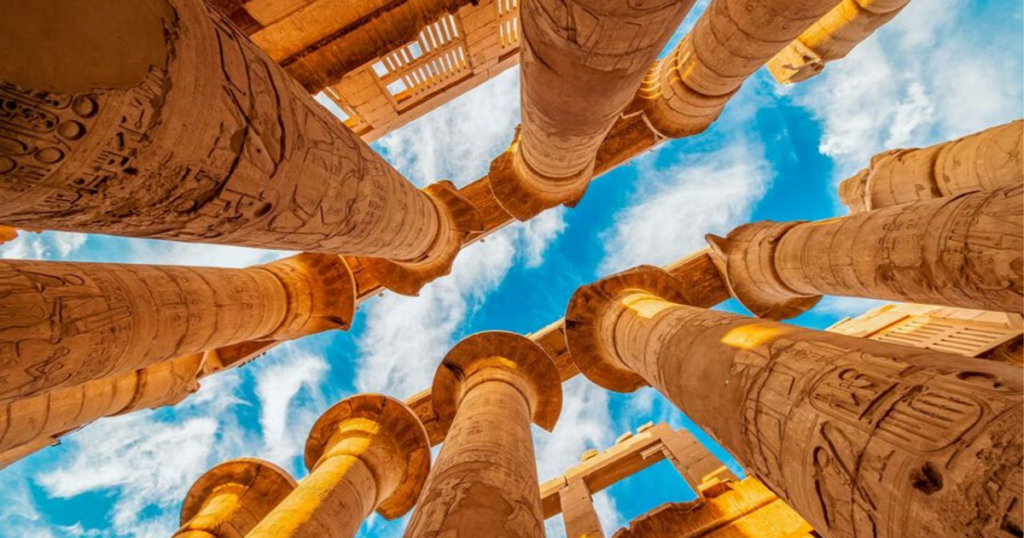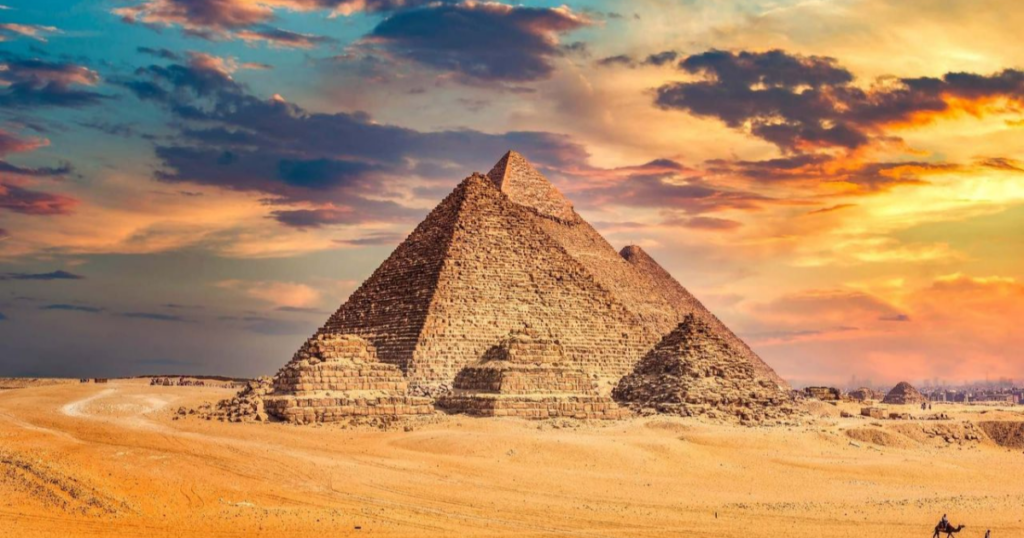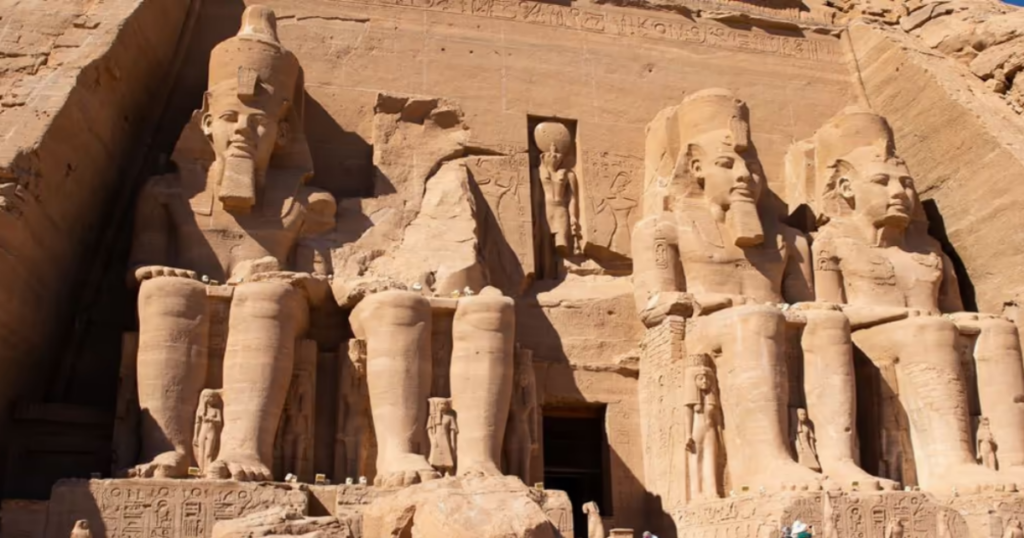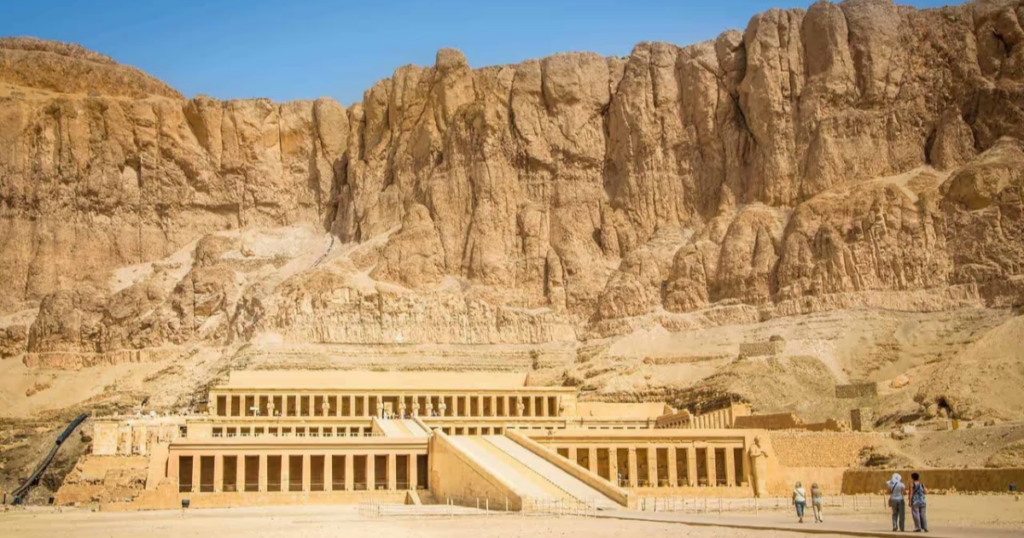Ancient Egypt: A Guide to the Top Travel Destinations and Hidden Gems
Egypt is a land of mystery, intrigue, and ancient wonders that have captivated travelers for centuries. From the iconic pyramids of Giza to the sprawling temples of Luxor, this country is a treasure trove of history and culture that must be experienced to be truly appreciated. In this article, we will take a journey through Egypt, delving into its fascinating history, exploring its unique culture and traditions, and highlighting some of the top places and landmarks that you simply must visit on your next trip to this incredible country. So, pack your bags, put on your explorer’s hat, and get ready to embark on a journey of a lifetime as we uncover the best of Egypt!
Also Read 15 Landmarks To Visit Before You Turn 65

History Of Egypt
Egypt is a country in the northeastern corner of Africa with a rich and storied history that spans millennia. The history of Egypt dates back to the prehistoric era, with evidence of human settlement in the region dating back to around 10,000 BC. However, the most well-known period of Egyptian history is that of the pharaohs, which lasted from approximately 3100 BC until the conquest of Egypt by Alexander the Great in 332 BC.
During the pharaonic period, Egypt was ruled by a succession of powerful kings, known as pharaohs. These pharaohs were considered divine beings by their subjects, and their rule was characterized by monumental building projects, sophisticated art and literature, and complex religious beliefs. Some of the most famous pharaohs include Khufu, who commissioned the construction of the Great Pyramid of Giza, and Tutankhamun, whose tomb was discovered nearly intact in 1922.
In addition to their impressive architectural and artistic achievements, the ancient Egyptians are also known for their sophisticated system of writing, which used hieroglyphics to record everything from religious texts to business transactions. This system of writing allowed for the preservation of a rich cultural heritage that has fascinated scholars and laypeople alike for centuries.
Over the centuries, Egypt was invaded and occupied by a variety of different groups, including the Persians, the Greeks, the Romans, and the Arab Muslims. These successive waves of conquest and cultural exchange left their mark on Egyptian society, shaping its language, religion, and customs.
In the modern era, Egypt has played a prominent role in regional and global politics. In the 20th century, the country underwent a series of political upheavals, including the overthrow of the monarchy in 1952 and the establishment of a republic under Gamal Abdel Nasser. In 1979, Egypt signed a historic peace treaty with Israel, which has helped to maintain relative stability in the region.
Today, Egypt is a country with a rich cultural heritage and a diverse population. Its history continues to fascinate scholars and visitors alike, with its ancient monuments and modern cities offering a glimpse into a complex and fascinating past.
Table of Contents

Culture And Tradition In Egypt
Egypt has a rich and vibrant culture and tradition that has been shaped by its long history and diverse population. Egyptian culture is characterized by a strong sense of community, family values, and religious traditions.
One of the most notable aspects of Egyptian culture is its cuisine, which is known for its bold flavors and unique spices. Some of the most popular dishes include ful medames, a stew made from fava beans and spices, and kushari, a vegetarian dish made with rice, lentils, and macaroni.
Egyptian music is also an important part of the country’s cultural heritage, with a rich tradition of folk music, classical music, and pop music. Instruments such as the oud, qanun, and darbuka are commonly used in traditional Egyptian music, while contemporary musicians incorporate modern instruments and styles.
Religion is an important aspect of Egyptian culture, with the majority of the population adhering to Islam. However, Egypt also has a significant Coptic Christian population, as well as smaller communities of Jews and other religious groups. Religious festivals and celebrations, such as Ramadan and Eid al-Fitr, are important events in the Egyptian calendar and are celebrated with food, music, and social gatherings.
Egypt is also known for its traditional crafts, such as pottery, weaving, and jewelry-making. These crafts have been passed down through generations and are still practiced in some parts of the country today.
Family is an important value in Egyptian culture, with close-knit family units and a strong emphasis on respect for elders. Gender roles are often traditional, with men typically occupying leadership roles and women responsible for caring for the home and children. However, there has been a gradual shift towards greater gender equality in recent years, with more women entering the workforce and occupying leadership positions.
Overall, Egyptian culture and tradition are diverse and multifaceted, with a rich history and a vibrant present. Whether it’s through music, food, or crafts, there are many ways to experience and appreciate the unique and fascinating culture of Egypt.

Top Places And Landmarks To Be Visited When In Egypt
Egypt is a country with a wealth of cultural and historical attractions, ranging from ancient temples and pyramids to bustling cities and stunning natural landscapes. Here are some of the top places and landmarks to visit in Egypt:
1) Giza Pyramids: The Pyramids of Giza are perhaps the most famous and iconic landmark in Egypt. These ancient structures, which were built over 4,500 years ago, were constructed as tombs for pharaohs and their consorts.
Also Read 15 Landmarks To Visit Before You Turn 65
2) Karnak Temple: Located in the ancient city of Thebes, Karnak Temple is a vast complex of temples, chapels, and halls that were built over a period of 1,500 years. It is one of the largest and most impressive religious complexes in the world.
3) Luxor Temple: Another ancient temple in Thebes, Luxor Temple is one of the best-preserved examples of temple architecture in Egypt. It features a variety of impressive sculptures, reliefs, and columns.
4) Valley of the Kings: The Valley of the Kings is a series of tombs that were built for pharaohs and their families. It contains some of the most well-preserved and impressive examples of ancient Egyptian art and architecture.

5) Abu Simbel: Located in southern Egypt, Abu Simbel is a pair of massive rock temples that were built by Ramses II in the 13th century BC. They are known for their impressive scale and intricate carvings.
6) Alexandria: Alexandria is a historic city located on the Mediterranean coast of Egypt. It was founded by Alexander the Great and served as the capital of Egypt during the Hellenistic period. It features a variety of impressive landmarks, including the Library of Alexandria and the Citadel of Qaitbay.
7) Cairo: Cairo is the capital city of Egypt and is home to a wealth of cultural attractions, including the Egyptian Museum, the Al-Azhar Mosque, and the Khan el-Khalili bazaar.
8) Sinai Peninsula: The Sinai Peninsula is a rugged and mountainous region that is home to a variety of natural attractions, including Mount Sinai, the Red Sea, and the St. Catherine Monastery.
9) White Desert: The White Desert is a unique natural landscape located in western Egypt. It is characterized by its striking white limestone rock formations, which have been shaped by wind and sand over thousands of years.
10) Siwa Oasis: Located in the Western Desert of Egypt, the Siwa Oasis is a remote and picturesque oasis town that is known for its stunning natural scenery and traditional culture. It features a variety of hot springs, salt lakes, and date palm groves.
Egypt is a country that is steeped in history, culture, and tradition. From its iconic pyramids and ancient temples to its bustling cities and stunning natural landscapes, Egypt offers a wealth of attractions and experiences for visitors.
Egypt is also a country of contrasts, with modern cities like Cairo and Alexandria sitting alongside traditional villages and remote oases. Whether you are interested in history, culture, or natural beauty, Egypt is a country that is sure to captivate and inspire.
Hope You Loved Our Take On The Arab Country, And It will br helpfull for you when you are visiting the country. Do Let us Know if there is any other country you would want us to write about
Also Read
15 Landmarks To Visit Before You Turn 65
Rainwater Harvesting: An Eco-Friendly Approach to Water Conservation
Tabora: Exploring the Heart of Tanzania
25 South Indian Food Near Me In USA: Where Tradition Meets Taste
Ear Troubles? Learn How to Get Water Out of Your Ear
Follow us on Youtube
Follow us on Facebook
Follow us on Twitter
Follow us on Instagram

